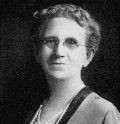Oedema of the throat and neck, great prostration, high fever, urine scanty, high colored. In most of the Mercurius iodatus ruber children, the diphtheria began on the left side. The fauces were dark red, the tongue coated thick yellow or there was absence of coating on the base. Swallowing was painful; tongue and gums swollen and sensitive and the throat was sensitive to touch.
The Arsenicum iodatum children had a thick membranous deposit covering mouth from fauces to outer edge of the lips and the external auditory canal; fetid breath; short difficult breathing; bad odor from the patient; diarrhoea on beginning to move in the morning. Only a few of the Arsenicum iodatum children were found in the diphtheria ward.
The nurse had much difficulty in saving the children, and heart failure often threatened, but at last the fife and drum corps was complete again and the squeaking of fife and rolling of drums sounded like the sweetest of music to the ears of the anxious relatives.
Grandfather Iodum knew that tuberculosis was very prevalent in his family and he ought to have insisted upon a physical examination of every member that joined his regiment instead of objecting to it. The tents were pitched just before the cold spring storms so the hardships of camp life began at once. Grandfather Iodum and several of his own sons came down with pneumonia. They were taken with violent chills, followed by high fever, pain in the chest, short, anxious breathing, expectoration gluey, rusty, yellow, streaked with blood, difficult. All recovered excepting one of the sons. The nurse sent him home as soon as possible, but it did no good. He became more emaciated, his voice became weak and rough, his face pale, cheeks red. There was continued fever, remitting only a few hours in the afternoon, profuse sweats, hunger, expectoration of blood, hemorrhages. He could not bear the warmth of the room, and phthisis hastened him into the other world.
Mercurius iodatus ruber had the grippe. He complained of a feeling of soreness in the whole chest, a catching pain under right breast on deep breathing, expectoration profuse, yellow. Mercurius iodatus flavus only had taken cold. Arsenicum iodatum had inherited phthisis from both sides of the house, so when he was exposed to cold, he didn’t stop to have grippe or pneumonia first but developed phthisis at once. He first noticed a slight hacking cough which became more and more frequent and sometimes it became loose. There was a mucopurulent and at times stringy sputa. There was no appetite, but he had great thirst for cold water and like his grandfather Arsenicum, he would vomit it almost as soon as taken. The left side of his chest became flattened. There was dullness on percussion, respiration became rapid and upon any exertion, wheezing became audible. He became asthmatic at night and had to sit up to breathe. The pulse became weak, hemorrhages appeared. There was great vital prostration. You can readily understand there was no place fit for him in the camp, so the nurse sent him home and it was none too soon for he hardly had strength enough left to get there.
You might expect Ferrum iodatum to inherit his grandfather Ferrum’s hemorrhagic nature but he didn’t. Ferrum was liable to hemorrhage from almost any place and at almost any time on the slightest provocation. Ferrum iodatum never had an indication of one until he was well gone in consumption. Ferrum iodatum really had consumption before he went to camp, but like his grandfather Ferrum he frequently had a flushed face, whereby he deceived himself into thinking that his health was better than it was. He convinced himself that camp life would agree with him because he always felt better in open air. In reality, he was weak and greatly emaciated. In the evening, he complained of chilliness, which was followed by heat and night sweats. The cough which was at first dry, later accompanied by greenish purulent expectoration containing small cheesy particles. There was great oppression of the chest with desire to take a deep breath but a deep breath caused feeling of soreness in the chest. He was much troubled with indigestion. He felt stuffed after eating a little food. The heart beat violently with no provocation. It would even awaken him at night. Ferrum iodatum should have remained at home.
The hardships of camp life thinned the ranks somewhat by sickness. Still there was a full regiment left and at last they were ready to be mustered in. Just at this time, along came Calcarea iodata and enlisted. He was a lazy, indifferent fellow somewhat resembling his grandfather Calcarea ostrearum. He explained that he had been having an attack of rheumatic gout and he didn’t think it much use to enlist when his neck was so stiff in the back that he could not move his head, and his hands and fingers were too numb to hold a gun and his legs were too tired to walk, besides the bruised beaten pain he had to endure.
Being at last ready, Grandfather Iodum notified Uncle Sam, but in the meanwhile there had been a great naval battle over which the neighbor’s children at home began to quarrel, all of which so frightened her that she hurriedly presented her unruly child to Uncle Sam and hastened home. Therefore, the war was over and Uncle Sam had no need of the regiment prepared for him, so it disbanded and every man, woman and child went home with a proud heart, feeling that he had done his best to “fight, bleed and die for his country.

